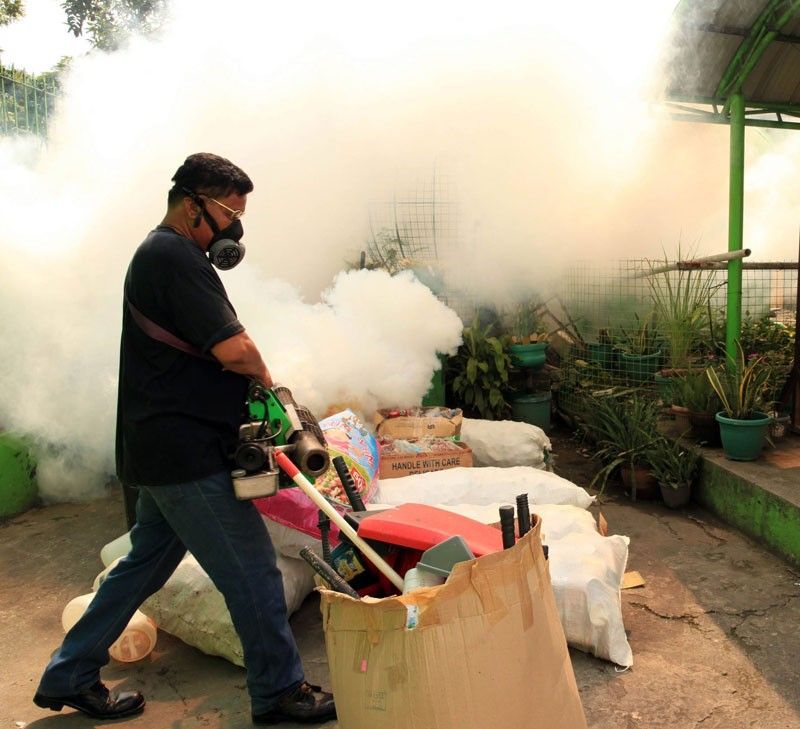Dengue alert: 89 deaths, 15,803 cases so far this year

MANILA, Philippines — The rise in dengue cases in the country has resulted in 89 deaths from January to the present, the National Risk Reduction and Management Council (NDRRMC) reported yesterday.
The fatalities mostly came from Western Visayas, with Negros Occidental registering the highest number of dengue-related deaths at 23, followed by Iloilo with 20, Aklan and Capiz with 15 each, Antique with five, Bacolod City with four and Guimaras with two validated fatalities.
“The Philippine Integrated Disease Surveillance and Response data for Western Visayas reported that the number of dengue cases exceeded the epidemic threshold in the period of January to June 2019,” NDRRMC executive director and Office of Civil Defense (OCD) administrator Ricardo Jalad said in the first dengue situation report yesterday.
From January to the present, there have been 2,095 dengue cases recorded in Aklan, 570 in Antique, 2,500 in Capiz, 486 in Guimaras, Iloilo with 5,237, Iloilo City with 718, Negros Occidental with 3,268, Bacolod City with 572 and 22 from other areas in the region and 57 cases in Sta. Fe in Leyte.
The towns of Pontevedra and President Roxas, in Capiz and in Maasin, Iloilo, have respectively declared a state of calamity due to the dengue outbreak in the three municipalities.
The Department of Health (DOH) presented this dengue outbreak report in last Monday’s NDRRMC’s Pre-Disaster Risk Assessment held at NDRRMC office Camp Aguinaldo.
Health Secretary Francisco Duque III is convening the health cluster of the NDRRMC to coordinate efforts following the declaration of National Dengue Alert last Monday.
Duque said that weekly dengue surveillance by Regional Epidemiology Surveillance Units of the DOH has been strengthened to monitor the possible spread of dengue in the country.
DOH data showed that from Jan. 1 to June 29 this year, there were 106,630 cases recorded nationwide. This is 85 percent higher compared to the same period last year wherein 57,564 cases were recorded.
“In coordination with the NDRRMC, through Undersecretary Jalad of the Office of Civil Defense, Code Blue is activated. DOH, as lead agency, will be convening the NDRRMC Health Cluster,” Duque noted.
On Monday, Duque declared a National Dengue Alert due to the rapid increase of mosquito-borne disease in several regions nationwide.
He identified the regions that have reached “localized epidemic” as Mimaropa, Western Visayas (Region VI), Central Visayas (Region VII) and Northern Mindanao (Region X).
The regions that hit the alert threshold are Ilocos, Cagayan Valley, Calabarzon, Bicol, Eastern Visayas, Zamboanga peninsula, Davao, Bangsamoro Autonomous Region in Muslim Mindanao and Cordillera Administrative Region.
This DOH report was accompanied by the department’s “Advisory on Dengue Preparedness and Outbreak Response,” following its activation of a Blue Alert status in response to the increasing number of dengue cases now being observed in several regions.
In Iloilo, the provincial health office, while continuously monitoring dengue cases, has released cot beds to district hospitals to accommodate patients.
The provincial government in Antique has provided mosquito screens to hotspot areas while an advisory has been issued to hospitals to prepare their respective facilities as well as supplies needed to treat dengue-infected patients.
In Capiz, the provincial government has established Dengue Crisis Management Committees and coordinated with the regional Department of Education for the conduct of the 4 p.m. habit to clean up schools.
Fumigation was also conducted in Guimaras with the activation of the Barangay Health and Emergency Response Teams.
In Negros Occidental, the provincial health office, in coordination with other local government health units, started conducting a door to door supplemental anti-dengue immunization activities.
In Central Visayas, the region’s OCD has coordinated with the regional health office for active monitoring as well as addressing the rise of dengue cases in Sta. Fe town in Leyte.
PhilHealth coverage
The Philippine Health Insurance Corp. (PhilHealth) has assured the public that confinements due to dengue are “compensable” following the declaration of dengue alert.
According to PhilHealth president and chief executive officer Ricardo Morales, they also relaxed the policy on “overbed capacity” in accredited hospitals in affected areas.
Morales said if there are beds along corridors, for instance, the dengue patients assigned there will be covered by PhilHealth.
Currently, PhilHealth correspondingly insures its eligible patients with dengue (with or without warning) and severe dengue at P10,000 and P16,000.
“These benefits are available at Level 1, 2 and 3 hospitals. In addition, non-severe dengue could be treated in primary care facilities with a package of P7,000,” he added.
He also said that even non-PhilHealth members can avail themselves of benefits “thru the Point of Service program where they are instantly afforded with health insurance.”
Morales added, “If assessed to be financially incapable by the hospitals’ social worker, the government will pay for a year’s premium at the time of their availment.”
As of June 2019, PhilHealth had already paid 174,000 dengue claims amounting to more than P1.7 billion.
Duque has also ordered the opening of dengue express lanes in different regions with the declaration of a National Dengue Alert due to the rise of the mosquito-borne disease.
Duque told Bombo Radyo Dagupan yesterday that he urged officials of the government’s different regional health offices to prioritize patients depending on their symptoms.
“Others can be treated at the rural health clinics first by giving them dextrose and treat them as soon as possible,” he said.
Duque said the declaration of National Dengue Alert is also an indication of dengue spike, a phenomenon that cannot be explained but occurs in other places in Southeast Asia every three years.
He added that such declaration is also to raise awareness of the people to be cautious and follow advisory of health authorities and local government officials.
People should follow the 4S strategy – search and destroy mosquito breeding places, seek early consultation, secure self protective measures and safe fogging in hot spot places, he added.
The Negros Occidental provincial health office reported that 23 dengue patients have died and 3,308 cases were recorded since January, prompting Gov. Eugenio Jose Lacson to declare a dengue heightened alert.
“Negros Occidental is on epidemic threshold alert, what we want to avoid is an outbreak,” Lacson said, upon issuing Executive Order No. 19-19 Series of 2019, placing the province on dengue heightened alert in all 31 local government units.
“We need to go back to basic cleanliness to prevent the proliferation of dengue carrying mosquitos,” Lacson said.
Bacolod City Mayor Evelio Leonardia ordered the City Health Office to link up with the 61 barangay chairmen and discuss strategies on how to combat spread of dengue. With Sheila Crisostomo, Eva Visperas, Gilbert Bayoran
- Latest
- Trending
































